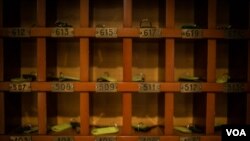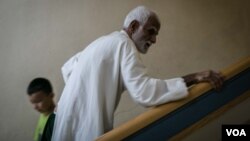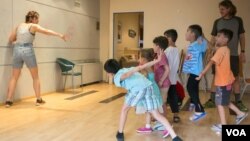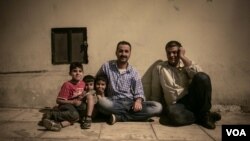City Plaza Hotel in Athens is once again at full capacity – but instead of having paying guests, it is home to refugees in search of a new life.
Located near the city’s Victoria Square, the hotel is the flagship of a left-wing movement that seeks to offer a new answer to the thorny question of how best Greece copes with its new population.
Although the hotel may have around 380 grateful residents, not everyone is happy about what is possibly Athens' biggest squat house.
Moment of decision
“We faced a moment of decision, and we decided to do this,” said Yortos Maniatis.
Maniatis is part of what he called the "Solidarity initiative" - an umbrella for various left-leaning groups, including anti-racist organizations and anarchists, who have sought to develop their own response to the refugee crisis.
Members of this group last month broke into the empty hotel, which has 100 fully furnished rooms.
The actions, said Maniatis, were driven by the closure of the Macedonian border in March, effectively stranding 54,000 refugees in Greece and creating a “huge problem of homeless refugees.”
Already facing a struggle in reviving the country’s economy, the Greek state has sought to get control of the issue by building refugee camps and encouraging refugees to occupy them.
The U.N.’s refugee agency has also helped out, working with several NGOs to offer 6,000 spaces for people to live, including 2,100 paid for spaces in hotels and 2,400 more in apartments.
Despite this, a major shortfall in adequate accommodation remains.
Although some camps are official, they are not always much of an improvement on the grim conditions refugees face in ad-hoc sites like Idomeni, on the Macedonian border, where many still remain.
The three-star hotel is another matter.
A big family
Stuck in Ritsona, one of the official camps where refugees are housed in tents rather than cabins provided elsewhere, Alaa’aa Nammoura was desperately seeking an alternative when he stumbled upon news online of City Plaza.
A few emails and a few days later, he was stunned when he stepped into the hotel’s reception area.
“It was just a case of ‘wow’- I couldn’t believe I was here,” said the English teacher from Damascus.
The hotel was in its prime during the country’s 2004 Olympics, but closed in subsequent years amid bankruptcy and claims that staff had not been paid.
Now, those living here can be found playing both the role of guest and staff, as they work with the activists in all the daily chores needed to keep the place running.
“We’re like a big family,” added Nour Tamine, a Syrian student of mechanical engineering who one day hopes to join her father in Germany.
For her, the opportunity to lend a hand is a welcome one.
“In Syria we worked; here we would like to work too.”
The closure of the border has shifted expectations that refugees may have to wait months, rather than weeks, to learn their fate – whether that means being relocated elsewhere in Europe, being granted asylum, or being sent back the way they came.
“Athens had been playing a more transitory role,” noted Maniatis, “but now these kinds of structures have to fill another need - they need to offer something more quasi-permanent.”
Precarious haven
The space may be a haven for its residents, but it remains a precarious one.
As well as taking on jobs like cooking and cleaning, some of those living at City Plaza also act as security staff - a far-right presence is known to be in the area.
Meanwhile, the building’s owner is thought to be pursuing possible legal action in an effort to get the residents kicked out.
The Solidarity movement is well resourced, whether it's in lawyers to battle the case, or donations of food to keep the 400 at City Plaza fed; but, as an organization consciously divorced from the workings of NGOs and the state, it nonetheless relies on authorities at the very least turning a blind eye.
For Kiriaki Klotki, a member of the movement and City Plaza’s acting receptionist, that is not enough.
She insists the hotel is something to be emulated, not shut down.
“We’ve got a lot of closed buildings, public ones, that can be opened up. This helps offer a solution, not just in Athens but beyond,” she said.
“This can help show not just how to deal with the refugee situation, but how to help them be part of this society.”







